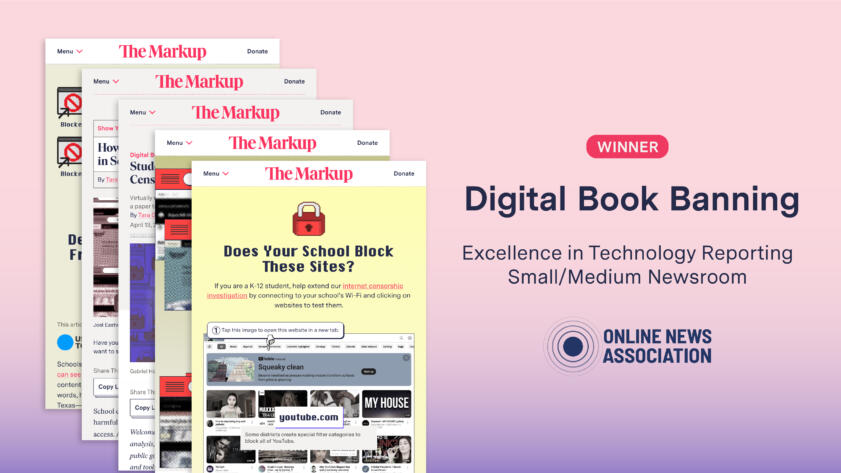The Markup’s investigative series on internet censorship in schools, “Digital Book Banning,” has won the Online News Association’s Excellence in Technology Reporting award in the small newsroom category.
The award recognizes excellence in digital journalism covering all aspects of technology, including culture, policy, and economic impact.
Judges said “this investigation uses technology, FOIA and crowdsourcing to discover a content censorship criteria and presents it in a clear and beautiful way. This team also explains its behind-the-scenes efforts so everyone can learn or get inspired by their cases to amplify impact.”
The honor marks a back-to-back win for The Markup, which last year took the same prize for its coverage of internet bandwidth disparities.
The most recent investigation emerged at a time of high-profile book bans in schools and public libraries across the country, focusing on less-examined “digital book bans,” in which internet access for K-12 students is censored.
Markup journalists spent months requesting records from school districts, challenging records denials, writing software to test school district blocking patterns, analyzing censorship records, and interviewing students, teachers, attorneys, constitutional law scholars, and advocates.
Reporter Tara García Mathewson anchored the reporting in the experiences of students who are routinely prevented from gathering information online. She traveled nearly 1,000 miles to the suburbs of St. Louis, Missouri, to talk to students and families in the Rockwood School District, which had one of the most aggressive web filtering systems of any district examined by The Markup. Tara also spent hours conducting phone and Zoom interviews with students in Texas, California, Michigan, and New York to round out her understanding of the filters’ harms.
The team revealed how web filters across 16 school districts in 11 states thwarted basic research and web browsing, forcing some students to resort to workarounds like personal cell phones and others to settle for an inferior educational experience. It also showed how some districts, blocked health and safety resources, including suicide prevention resources for LGBTQ+ teens, abortion information, and sex education, that other districts made available. The investigation also raised questions over whether districts have improperly exceeded the regulations that mandate internet filtering.
The Digital Book Banning series includes the following pieces:
- Main story: Schools Were Just Supposed To Block Porn. Instead They Sabotaged Homework and Censored Suicide Prevention Sites
- Gallery: Five High Schoolers Describe the Dangers and Frustrations of Censored Web Access
- Interactive survey: Does Your School Block These Sites?
- Show Your Work: How We Investigated Web Censorship in Schools
- Public resource: Students: Investigate Internet Censorship in Your School District
Congratulations to the team for the recognition of their hard work: Tara García Mathewson (investigative reporting), Joel Eastwood and Gabriel Hongsdusit (design and development), Tomas Apodaca and Miles Hinton (additional reporting and development), Maria Puertas (engagement and writing), Emerson Malone (copy editing), Ryan Tate and Sisi Wei (editing).
In addition, stay tuned for more Online Journalism Award winners to be announced in September. The Markup is a finalist for general excellence among small newsrooms and a finalist for overall excellence in community-centered journalism for “Languages of Misinformation.” Also, CalMatters, of which The Markup is now a part, is an Online Journalism Awards finalist for general excellence among medium newsrooms.
Congratulations, too, to all of this year’s ONA award winners.





